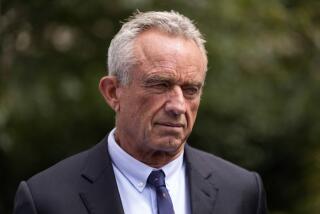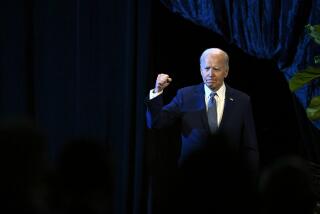McCain moves toward ’08 presidential run
- Share via
WASHINGTON — Striding through the wreckage of the midterm election, Sen. John McCain (R-Ariz.) will take a major step today toward a 2008 presidential bid by announcing he has established a committee to formally explore a campaign and making two major speeches laying out his vision for the future of the GOP.
McCain has been considered the front-runner for the Republican nomination in a field that changed rapidly after the tumultuous midterms.
In response to the party’s big losses, McCain has been moving to make a fresh appeal to the surly voters who helped end GOP control of the House and the Senate -- Republicans and independents angry about government corruption and excessive spending.
That anger contributed to Democratic gains in 2006, but it may open a political opportunity for McCain in 2008 by highlighting concerns about lax ethics and pork-barrel spending -- his signature issues.
“For years he’s been on a one-man crusade against wasteful spending in Washington,” says a biography of McCain on www.exploremccain.com, the website launched Wednesday by his exploratory committee. “Because of his crackdown on waste in government, he’s been nicknamed ‘The Sheriff.’ ”
But the midterms underscore a growing risk for McCain on another front: Polls show that a majority of voters disapprove of the war in Iraq and want at least some troops withdrawn, and McCain is almost alone in calling for a larger deployment. He reinforced that position Wednesday when, at a Senate hearing, he upbraided military leaders for not calling for more troops.
“I’m of course disappointed that basically you’re advocating the status quo here today, which I think the American people in the last election said ... is not an acceptable condition,” he said.
Other potential White House contenders are jockeying for position as well. On Wednesday, former Wisconsin Gov. Tommy G. Thompson, secretary of Health and Human Services in President Bush’s first term, said he intended to form a presidential exploratory committee.
Earlier this week, former New York Mayor Rudolph W. Giuliani also took a step in that direction. Massachusetts Gov. Mitt Romney is courting evangelical Republicans. Rep. Duncan Hunter (R-El Cajon) has announced a longshot White House bid.
But allies of McCain, whose maverick streak is thought to have cross-party appeal, say he is in the best position to thrive in the aftermath of election results that illustrated the GOP’s weakness among independents.
“John is probably emboldened to run for president because our party is adrift in areas where I think he has a lot to offer,” said Sen. Lindsey Graham (R-S.C.), a McCain ally.
McCain has said he will make no decision about running until he and his family discuss it over the Christmas holiday. But rarely does a person set up an exploratory committee and decide not to run. Having such a committee allows potential candidates to raise money and begin establishing a political organization while they are testing the waters for a formal run.
McCain’s speech today to GOPAC, a conservative political group, is intended as his first broad assessment of the state of the GOP and how he would lead it. A source familiar with the speech said McCain aspired to fill the post-midterm political vacuum in the same way Ronald Reagan did in a fabled speech after the GOP lost the White House in 1976.
McCain has been arguing that Republicans lost ground this year because the party strayed from its conservative principles of fiscal restraint and political reform with a spate of scandals, the creation of expensive programs like the Medicare drug benefit and the proliferation of pork-barrel spending.
“We Republicans have lost our way,” McCain has said. “We came to Washington to change government, and government changed us.”
McCain also will speak today to the Federalist Society, an organization of conservative lawyers that has been at the heart of bitter Senate debates over confirmation of Bush’s judicial nominees. That faction of the party was furious with McCain and others in a bipartisan group of senators, nicknamed the Gang of 14, who last year blocked a bid by GOP leaders to deny Democrats the right to filibuster judicial nominations.
Conservative lawyers aren’t the only ones in the GOP base who view McCain with suspicion. He alienated social conservatives with a 2000 speech harshly critical of the influence of evangelical leaders in the GOP. His support for giving illegal immigrants a path to citizenship, his concern about global warming and his opposition to Bush’s tax cuts have earned him ire from many on the right.
On the war, McCain risks alienating another constituency -- the majority of Americans who said in exit polls that they wanted U.S. troop strength in Iraq reduced. McCain has been one of Bush’s most stalwart supporters of the mission in Iraq, although he has been critical of the way the administration has prosecuted the war.
He has argued that ending instability in Iraq requires a larger U.S. military presence. His advisors contend that whatever political risk McCain runs by taking that position, he would take a bigger risk of looking like a political opportunist if he reversed field and called for withdrawal.
“It’s classic McCain,” said Mark McKinnon, one of his advisors. “He’s always willing to do the unpopular thing. Even people who disagree with him about the troops will feel, ‘At least he’s being straight with us.’ ”
But his critics say that because voters’ emotions about Iraq run so deep, his views on the war will probably undercut his appeal to independents.
“Independents are concerned and angry about the war in Iraq, and John McCain has consistently said that we should stay the course,” said Stacie Paxton, a spokeswoman for the Democratic National Committee. “If John McCain’s political strategy is to appeal to independents, his position on the Iraq war is a serious problem for him.”
*
More to Read
Get the L.A. Times Politics newsletter
Deeply reported insights into legislation, politics and policy from Sacramento, Washington and beyond. In your inbox twice per week.
You may occasionally receive promotional content from the Los Angeles Times.











